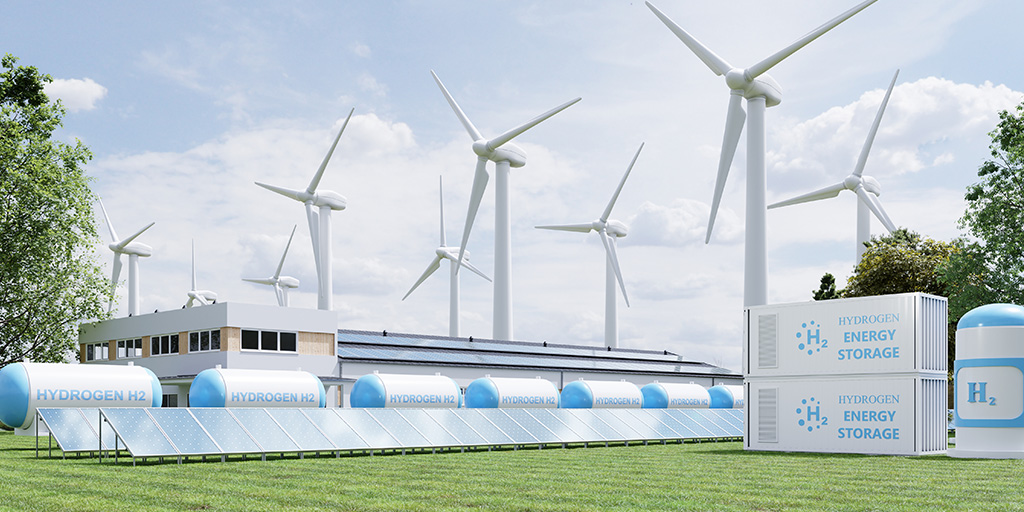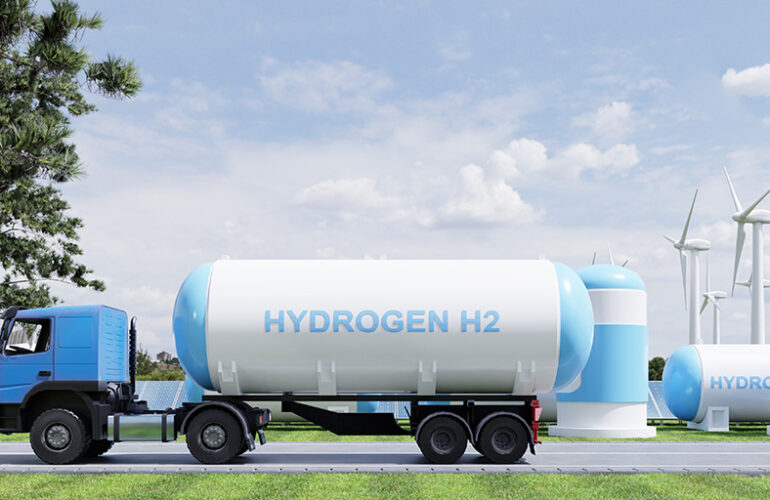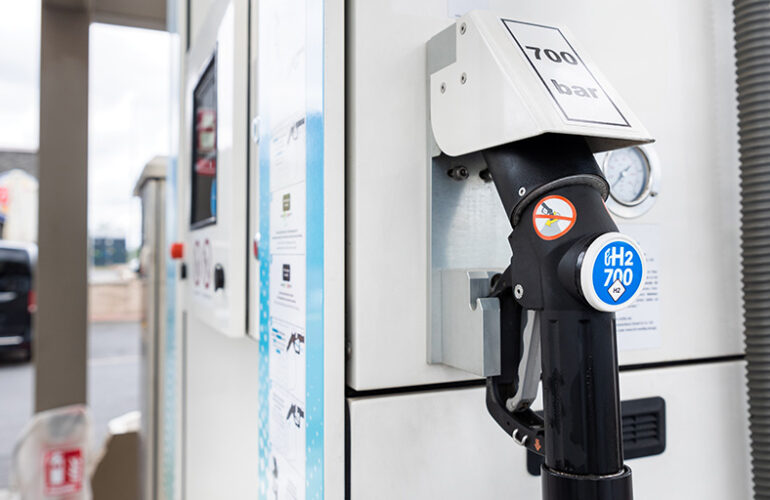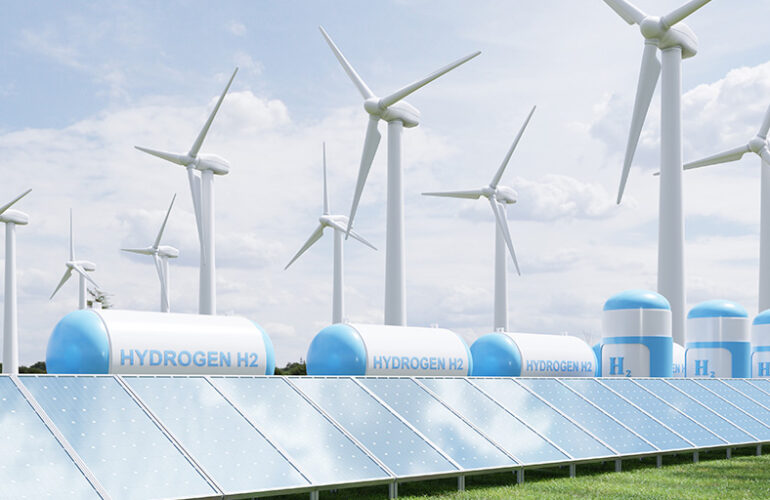HYDROGEN STORAGE SOLUTIONS
Thanks to our innovative hydrogen production systems, we offer the ability to convert renewable energy surpluses into clean hydrogen, which can be stored and used across various sectors of the economy.
Effective hydrogen storage is crucial for ensuring energy stability and flexibility. We provide storage systems tailored to diverse needs:
1. Compressed Hydrogen: Stored at high pressure, enabling significant energy storage in a compact volume.
Compressed hydrogen is one of the most commonly used hydrogen storage methods due to its ability to store large amounts of energy in a relatively small volume. In this technology, hydrogen is compressed to high pressures, typically ranging from 350 to 700 bar, allowing efficient gas storage in specially designed, durable tanks.
Advantages of Compressed Hydrogen Storage:
- High Energy Density: Hydrogen stored under high pressure takes up less space, allowing large amounts of energy to be stored in relatively compact tanks. This system is well-suited for mobile applications, such as transportation or emergency power supply.
- Ease of Access and Quick Refueling: For hydrogen transport, such as fuel for vehicles, compressed hydrogen enables quick refueling, simplifying the logistics of hydrogen storage and distribution within fueling infrastructure.
- Safe Storage in Durable Tanks: Pressure tanks for hydrogen storage are made of advanced composite materials or special metal alloys that withstand extreme pressures, providing maximum safety in use and minimizing the risk of leakage or explosion.
- Application Flexibility: Compressed hydrogen storage is suitable for a wide range of applications, from small, portable tanks for household use to large industrial and infrastructure installations. These systems are also used in hydrogen refueling stations, supporting the development of hydrogen transportation.
- Mobility and Transportability: Compressed hydrogen is more practical to transport than liquid hydrogen since it doesn’t require extreme low-temperature maintenance, making it a more economical solution for delivering hydrogen to various locations without complicated cooling.
The safety and efficiency of compressed hydrogen storage make this technology essential for the transportation sector and energy storage infrastructure. With its ease of storage and quick refueling capabilities, compressed hydrogen is an excellent choice for hydrogen-powered vehicles and systems requiring a stable, accessible energy source.
2. Liquid Hydrogen: Cooled to extremely low temperatures, increasing density and enabling greater energy storage in smaller spaces.
Liquid hydrogen storage involves cooling hydrogen gas to -253°C (20 K), converting it into a high-energy-density liquid. This enables large amounts of energy to be stored in smaller spaces, which is especially useful in applications requiring high storage capacity in minimal volumes.
Advantages of Liquid Hydrogen Storage:
- Increased Energy Density: Condensing hydrogen to a liquid state allows much greater energy storage in a smaller volume, which is particularly effective where storage space is limited, such as in space applications or vehicles requiring extended range.
- Reduced Weight with High Energy Capacity: Liquid hydrogen reduces tank weight while maintaining high energy capacity, crucial for long-distance hydrogen transport. This technology is widely used in aerospace, where minimizing weight is a priority.
- Ease of Large-Scale Transport: In liquid form, hydrogen takes up less space, making it more practical for long-distance transport, such as intercontinental shipping. It can be stored in thermally insulated cryogenic tanks that maintain low temperatures and ensure the stability of stored hydrogen.
- Efficient Refueling Capability: Liquid hydrogen allows for quick refueling in certain industrial and transportation applications. Compared to compressed hydrogen, which requires high pressure, liquid hydrogen refueling doesn’t involve compression, which is beneficial for specific types of vehicles.
- Suitability for High-Energy Applications: Liquid hydrogen is ideal for large industrial installations and infrastructure projects that require a stable, high-density energy source. Industrial manufacturing plants, large-scale energy storage facilities, and transoceanic transport are areas where liquid hydrogen is commonly used.
Challenges of Liquid Hydrogen Storage:
- High Cooling and Insulation Costs: Maintaining hydrogen in a liquid state requires cryogenic tanks with insulation to stabilize temperatures at -253°C. Cooling and maintaining such low temperatures require substantial energy and technological investment, increasing operational costs.
- Evaporation: Even with excellent insulation, some liquid hydrogen may gradually evaporate due to temperature rises, a phenomenon known as “boil-off.” Additional systems are needed to minimize losses during storage and transport.
Liquid hydrogen storage is a key solution for applications needing high storage capacity and compact tanks. Despite technological challenges, liquid hydrogen is used where achieving high energy density is essential, and resources are available for maintaining cryogenic storage.
.
3. Chemical Hydrogen Storage: Hydrogen can be safely stored as chemical compounds, reducing the need for high pressure and low temperatures.
Chemical hydrogen storage allows for safe storage of hydrogen by binding it in the form of stable chemical compounds, such as metal hydrides, ammonia, formic acid, or liquid organic hydrogen carriers (LOHC). This method eliminates the need for high pressure and extreme low temperatures required by traditional hydrogen storage methods.
Advantages of Chemical Hydrogen Storage:
- Safety: Chemically bound hydrogen doesn’t require high pressure or low temperatures, reducing the risk of leaks and ignition. This storage method is more stable and safer for long-term storage and transport.
- Elimination of Cryogenic or Pressure Tanks: Storing hydrogen in chemical compounds avoids the costs and complexity of cryogenic cooling or high-pressure storage infrastructure. Instead, standard tanks can be used, simplifying large-scale hydrogen distribution.
- Ease of Transport: Chemically stored hydrogen can be transported safely in standard tanks, facilitating long-distance distribution and allowing the use of existing transport infrastructure.
- High Storage Stability: The chemical compounds used to store hydrogen offer high stability, allowing for long-term storage without energy loss, which is crucial for hydrogen storage or transport over extended periods.
- Versatile Applications: Chemical hydrogen storage is beneficial for applications requiring a stable, readily available hydrogen source, particularly in industries where hydrogen can be released and used as needed.
Examples of Chemical Storage Carriers:
- Metal Hydrides: Hydrogen is chemically bound with metals such as magnesium or palladium, creating stable compounds that can store hydrogen at lower pressures.
- Liquid Organic Hydrogen Carriers (LOHC): Organic compounds, such as toluene, can chemically bind hydrogen and then release it through heating or catalytic reaction.
- Ammonia: A stable chemical compound that’s easy to transport and store, and hydrogen can be readily released from it with catalysts.
- Formic Acid: As a hydrogen carrier, formic acid allows for safe and easy hydrogen release for industrial purposes.
Challenges of Chemical Hydrogen Storage:
- Hydrogen Recovery Process: Releasing hydrogen from chemical carriers often requires additional energy or special catalysts, impacting the system’s overall efficiency.
- Complex Industrial Processes: Some chemical compounds require complex production and recycling processes, necessitating advanced infrastructure and technology.
Chemical hydrogen storage is an innovative, safe solution that allows for easy storage and transport without complex, high-pressure, or cryogenic systems. This technology opens new possibilities for industry and transportation, supporting hydrogen infrastructure development and enabling easy hydrogen storage where traditional methods would be impractical or too costly.

































